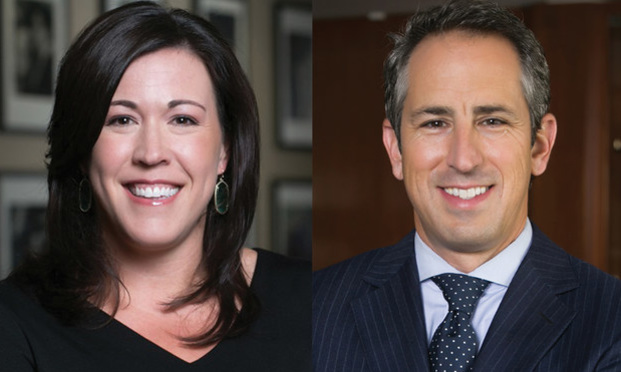How Culture Can Drive Your Bottom Line
When asked to define a law firm's culture, firm leaders are quick to provide an extensive list of perks their organizations offer including firm-sponsored outings, on-site food services, yoga classes and more.
April 08, 2019 at 09:51 AM
7 minute read
The original version of this story was published on Law.com
 Lara Day, (left) Chief Culture & Communications Officer and Adam J. Agron, (right) managing partner for Brownstein Hyatt Farber Schreck.
Lara Day, (left) Chief Culture & Communications Officer and Adam J. Agron, (right) managing partner for Brownstein Hyatt Farber Schreck.
When asked to define a law firm's culture, firm leaders are quick to provide an extensive list of perks their organizations offer including firm-sponsored outings, on-site food services, yoga classes and more. We know this list because several years ago, we'd have said the same thing. And while those benefits often contribute to employee happiness, they do not define a company's culture. Organizational culture goes far beyond perks. Rather, it is about sharing the same purpose and values, working toward similar goals, building relationships, finding meaning and pride in the work that you do and, ultimately, improving the performance of your business. Bottom line, an organization's culture is its values in action.
It is well-established that a strong organizational culture results in more engaged and more fulfilled employees. Employees with higher rates of satisfaction remain at organizations for longer periods of time, are more productive and drive better profitability. Research also shows that companies with strong cultures outperform the competition by 20 percent, earn up to 1.7 percent more than their peer firms and perform 2.1 percent better than industry benchmarks.
It's no secret that organizations in the professional services industry—legal, accounting and consulting firms—are not top of mind when one thinks about strong and identifiable cultures. Instead, people think of companies like Facebook, Google or Zappos. The reality is that while consumer-facing brands tend to get attention for having distinct cultures, a strong culture is critically important to the long-term success of any business. This is particularly true for companies in the client-service space where our employees are our work product and they are creating (or damaging) client loyalty on a daily basis.
Law firms are facing their greatest challenges in a generation and change isn't just coming—it's already here. New entrants (including alternative service providers, accounting firms and virtual law firms), technological advances such as artificial intelligence, and growing in-house legal departments coupled with rate pressure, rising costs of doing business and a constant supply of new lawyers are placing unprecedented stress on the industry. These changes are resulting in flat to modest year-over-year demand growth for most firms and declining net income for many. In response to these factors, law firms are scaling or merging at a record pace, which is creating larger and more geographically diverse organizations at the cost of any distinct culture that may have been present before the consolidation.
We've taken a different approach in response to these challenges. Rather than growing our way out of the challenges like many firms, we are focused on strengthening our culture. That doesn't mean we're not growing—in fact, growth is an important part of our firm's long-term strategic plan. Rather, our growth is intentionally designed to preserve and build upon the foundation of our culture and values.
Our focus on culture began as we were approaching our 50th year in business and our founders were no longer in the day-to-day leadership of the firm. We knew our founders were responsible for instilling many of the values that comprise our culture and we wanted to institutionalize and operationalize the positive aspects of our culture so that they would be carried on as we became a second-generation firm. Our leadership team realized that we had to find a way to ensure that the firm's values lived on even if the leaders who established them were no longer present every day.
Our extensive research told us that relationships—with colleagues, clients and our communities—are the key reasons why people come to, remain with and hire our firm. We also identified authentic values that drive our performance: All in, excellence, respect and giving back. It was clear that when we are making decisions that are in sync with our values, we can compete with any firm in the country when it comes to the quality and value of our work, our ability to acquire and keep clients and our recruiting and retention of talent, among other factors.
We developed and launched a strategic initiative to educate, engage and empower our employees regarding our purpose and values with the ultimate goal of having our values incorporated into every significant decision they make, every interaction they have and every outcome they deliver. Our intention was not to create a new culture or change our culture (most experts on organizational culture believe that is virtually impossible), but rather we sought to be more intentional about our culture and make it a cornerstone of running our business.
We incorporated our values into our compensation, performance reviews and lateral candidate interview process. We professionalized the leadership and management of the firm through improved governance, strategic planning and leadership development. We created specific leadership job descriptions to better reflect our values and refined our leadership selection process. Annually, the firm recognizes one employee who embodies the firm's values and inspires others. Today, we're designing a program for future firm leaders, revamping our onboarding to better reflect the firm's values and developing a training program to help provide feedback consistent with our values. It's important to note not every initiative has succeeded, nor are we anywhere close to done. But this is something we're committed to year in and year out.
Finally, to signify the importance of our culture initiative, we created a chief culture officer (CCO) to both spearhead the movement and oversee operationalizing our values. Our CCO is a senior member of our management team who, among other things, interacts with our managing partner, chief operating officer and broader leadership group, including our practice group leaders, on a daily basis. We have only found a handful of firms that have made such a meaningful commitment to their culture.
Operationalizing our values and implementing them into every aspect of our business has resulted in better client service and outcomes, enhanced professional development and improved recruiting and retention because our people are now more often working toward shared goals. Our employees have also reported finding more purpose and meaning in their work. And, significantly, these changes have helped to drive better financial performance. Since launching this initiative a few years ago, firm revenue and revenue per lawyer have each grown by 22 percent and profits per partner have improved by 32 percent.
Cultivating your firm's culture takes a significant investment of time and talent. There will be critics and initiatives will fail, but if it's done well, investing in your culture will yield a return on that investment both financially and in the quality of employee experience. Every organization has its own culture and your job is to determine the unique values that make up your culture and then seek to strengthen and be more deliberate about them. While each firm has a different path to establishing its culture, our story began with our transition to a second-generation law firm—something few firms are able to successfully pull off. As Simon Sinek, one of the world's most respected thought leaders on culture, said, “All organizations start with WHY, but only the great ones keep their WHY clear year after year. Those who forget WHY they were founded show up to the race every day to outdo someone else instead of to outdo themselves.”
Adam Agron has served as managing partner of the law firm Brownstein Hyatt Farber Schreck since 2013. He is also a member of the firm's executive committee and maintains his practice as an M&A attorney where he represents private and public companies, professional investors and entrepreneurs in a diverse set of transformative transactions ranging in size from less than $100 million to in excess of $1 billion.
Lara Day serves as the firm's chief culture and communications officer where she is responsible for researching, cultivating and preserving Brownstein's organizational culture. She also oversees the firm's internal and external communications strategy and public relations efforts.
This content has been archived. It is available through our partners, LexisNexis® and Bloomberg Law.
To view this content, please continue to their sites.
Not a Lexis Subscriber?
Subscribe Now
Not a Bloomberg Law Subscriber?
Subscribe Now
NOT FOR REPRINT
© 2025 ALM Global, LLC, All Rights Reserved. Request academic re-use from www.copyright.com. All other uses, submit a request to [email protected]. For more information visit Asset & Logo Licensing.
You Might Like
View All
KPMG Law Seeks Alternative Business License, Shaking Up Legal Status Quo
3 minute read

With 'Fractional' C-Suite Advisers, Midsize Firms Balance Expertise With Expense
4 minute readTrending Stories
- 1Meta Pulls Plug on DEI Programs
- 2On the Move and After Hours: Meyner and Landis; Cooper Levenson; Ogletree Deakins; Saiber
- 3State Budget Proposal Includes More Money for Courts—for Now
- 4$5 Million Settlement Reached With Stone Academy
- 5$15K Family Vacation Turned 'Colossal Nightmare': Lawsuit Filed Against Vail Ski Resorts
Who Got The Work
Michael G. Bongiorno, Andrew Scott Dulberg and Elizabeth E. Driscoll from Wilmer Cutler Pickering Hale and Dorr have stepped in to represent Symbotic Inc., an A.I.-enabled technology platform that focuses on increasing supply chain efficiency, and other defendants in a pending shareholder derivative lawsuit. The case, filed Oct. 2 in Massachusetts District Court by the Brown Law Firm on behalf of Stephen Austen, accuses certain officers and directors of misleading investors in regard to Symbotic's potential for margin growth by failing to disclose that the company was not equipped to timely deploy its systems or manage expenses through project delays. The case, assigned to U.S. District Judge Nathaniel M. Gorton, is 1:24-cv-12522, Austen v. Cohen et al.
Who Got The Work
Edmund Polubinski and Marie Killmond of Davis Polk & Wardwell have entered appearances for data platform software development company MongoDB and other defendants in a pending shareholder derivative lawsuit. The action, filed Oct. 7 in New York Southern District Court by the Brown Law Firm, accuses the company's directors and/or officers of falsely expressing confidence in the company’s restructuring of its sales incentive plan and downplaying the severity of decreases in its upfront commitments. The case is 1:24-cv-07594, Roy v. Ittycheria et al.
Who Got The Work
Amy O. Bruchs and Kurt F. Ellison of Michael Best & Friedrich have entered appearances for Epic Systems Corp. in a pending employment discrimination lawsuit. The suit was filed Sept. 7 in Wisconsin Western District Court by Levine Eisberner LLC and Siri & Glimstad on behalf of a project manager who claims that he was wrongfully terminated after applying for a religious exemption to the defendant's COVID-19 vaccine mandate. The case, assigned to U.S. Magistrate Judge Anita Marie Boor, is 3:24-cv-00630, Secker, Nathan v. Epic Systems Corporation.
Who Got The Work
David X. Sullivan, Thomas J. Finn and Gregory A. Hall from McCarter & English have entered appearances for Sunrun Installation Services in a pending civil rights lawsuit. The complaint was filed Sept. 4 in Connecticut District Court by attorney Robert M. Berke on behalf of former employee George Edward Steins, who was arrested and charged with employing an unregistered home improvement salesperson. The complaint alleges that had Sunrun informed the Connecticut Department of Consumer Protection that the plaintiff's employment had ended in 2017 and that he no longer held Sunrun's home improvement contractor license, he would not have been hit with charges, which were dismissed in May 2024. The case, assigned to U.S. District Judge Jeffrey A. Meyer, is 3:24-cv-01423, Steins v. Sunrun, Inc. et al.
Who Got The Work
Greenberg Traurig shareholder Joshua L. Raskin has entered an appearance for boohoo.com UK Ltd. in a pending patent infringement lawsuit. The suit, filed Sept. 3 in Texas Eastern District Court by Rozier Hardt McDonough on behalf of Alto Dynamics, asserts five patents related to an online shopping platform. The case, assigned to U.S. District Judge Rodney Gilstrap, is 2:24-cv-00719, Alto Dynamics, LLC v. boohoo.com UK Limited.
Featured Firms
Law Offices of Gary Martin Hays & Associates, P.C.
(470) 294-1674
Law Offices of Mark E. Salomone
(857) 444-6468
Smith & Hassler
(713) 739-1250











